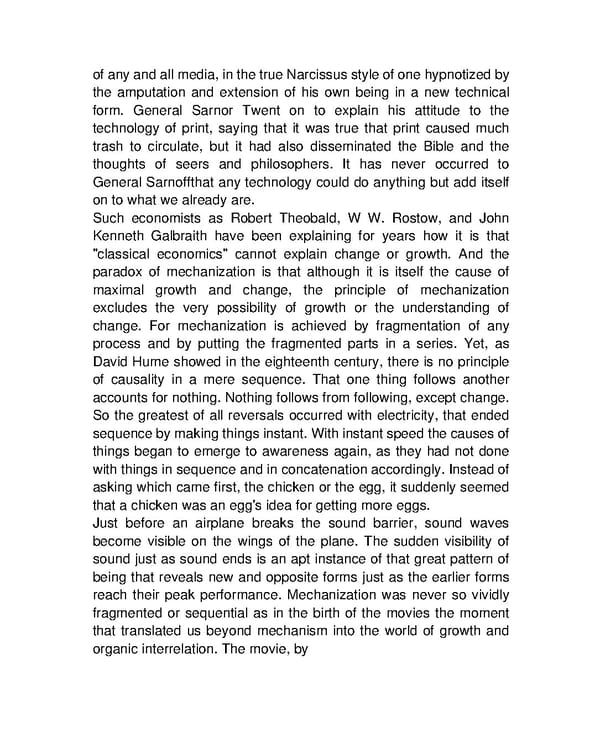of any and all media, in the true Narcissus style of one hypnotized by the amputation and extension of his own being in a new technical form. General Sarnor Twent on to explain his attitude to the technology of print, saying that it was true that print caused much trash to circulate, but it had also disseminated the Bible and the thoughts of seers and philosophers. It has never occurred to General Sarnoffthat any technology could do anything but add itself on to what we already are. Such economists as Robert Theobald, W W. Rostow, and John Kenneth Galbraith have been explaining for years how it is that "classical economics" cannot explain change or growth. And the paradox of mechanization is that although it is itself the cause of maximal growth and change, the principle of mechanization excludes the very possibility of growth or the understanding of change. For mechanization is achieved by fragmentation of any process and by putting the fragmented parts in a series. Yet, as David Hume showed in the eighteenth century, there is no principle of causality in a mere sequence. That one thing follows another accounts for nothing. Nothing follows from following, except change. So the greatest of all reversals occurred with electricity, that ended sequence by making things instant. With instant speed the causes of things began to emerge to awareness again, as they had not done with things in sequence and in concatenation accordingly. Instead of asking which came first, the chicken or the egg, it suddenly seemed that a chicken was an egg's idea for getting more eggs. Just before an airplane breaks the sound barrier, sound waves become visible on the wings of the plane. The sudden visibility of sound just as sound ends is an apt instance of that great pattern of being that reveals new and opposite forms just as the earlier forms reach their peak performance. Mechanization was never so vividly fragmented or sequential as in the birth of the movies the moment that translated us beyond mechanism into the world of growth and organic interrelation. The movie, by
 Understanding Media by Marshall McLuhan Page 13 Page 15
Understanding Media by Marshall McLuhan Page 13 Page 15